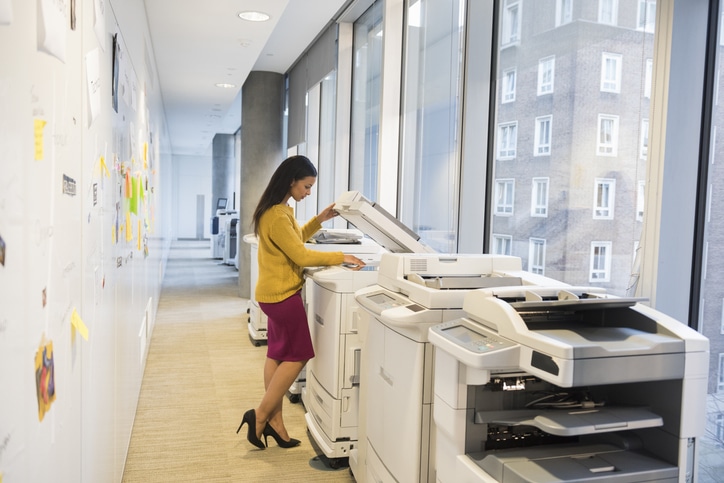Should You Buy a Copier or Lease It?
Trying to decide whether to lease a copier or buy a copier? Find out the pros and cons. See when buying or leasing may be the best option for your business.

No single piece of equipment in the office takes more of a beating than the floor-standing copier.
Day in and day out it endures transitions between high heat and frigid office temps, paper jam tug-of-war, lid slamming and endless pieces of paper traveling at lightning speed across its rollers. All of this demanding work takes a toll on the device, giving it an average lifespan of just five years in a busy office.
Eventually, you’ll find yourself needing to find a replacement and the question arises: should you lease or buy a copier? There’s no one-size-fits-all answer to that question. These pros and cons will help you make the right choice for you and your business.
Why Buy a Copier?
When you’re playing the long game, buying a copier is usually the less expensive option–when it comes to the cost of the copier. You’ll avoid finance charges and other fees. You’ll also avoid a hard credit check, which may impact your credit score. If you’re a smaller or growing business, you like to keep your credit as clean as possible.
And even if you did have to put it on credit, the printer is yours after you finish paying for it. Some high-quality floor copiers can last up to 10 years, especially if you’re not a high-volume office. So that may be a very good deal.
Okay. So it sounds like buying is the way to go. But wait! There are some cons to consider.
When Buying a Copier Isn’t Your Best Option
Since the dawn of time, technology has never stood still. And the rate of change is only getting faster. A bought printer may have everything you need today. But no one really knows what businesses may need in 10 years. That could put you at a competitive disadvantage against newer companies in the future with the latest technology.
If you needed to resell that printer because you weren’t using it like you thought or needed to free up cash, you might recoup 50% if you sold it immediately, but in 5 years, it would probably cost more for someone to move it than they’d pay for the copier.
Not unlike a car, it’s not going to hold its value.
If your rainy day fund is tapped out and you’d have to put buying a copier on credit, interest charges may make the copier cost a lot more than you think you’re saving by buying over leasing a copier.
Finally, an aging printer will also begin to require more maintenance to keep it running smoothly. And you might find yourself feeling like you have to keep it past its prime to get your money’s worth. That may cost you in employee productivity and lost wages.
Why Lease a Copier?
Leasing a copier does make sense if you need to have clear terms from month-to-month. You know upfront how much you pay each month and for how long. That’s often easier on the budget. If cash flow is tight and you’d have to finance a bought printer anyway, leasing may actually end up saving you money.
When your term ends, you’re not stuck with a printer that may now be outdated or breaking down. You can upgrade when you renew your lease. Or, depending on the lease terms, you may be able to buy the copier at the end of the lease for a minimal cost if it’s still working for you.
A newer copier needs less maintenance and functions more efficiently, increasing workplace productivity and reducing worker frustration around inadequate technology. If the leased copier needs maintenance or stops working entirely, that’s likely the responsibility of the leasing company.
That’s not an emergency expense you have to worry about.
When Leasing a Copier Isn’t Your Best Option
You will pay more for the leased copier than you otherwise would. Those pros of leasing listed above come at a price. It’s important to realize that those are what you’re paying for, not just the copier. In a way leasing is another way to manage risk. Not unlike buying insurance, you’re paying the leasing company to take on what would otherwise be your risk.
Every business has a certain amount of risk they’re comfortable managing and planning for. Leasing a copier may not make sense for you if you’re in a position where you can effectively manage more risk. That copier may last you 15 years or five. You just don’t know because lifespan is so strongly affected by how your office uses it.
Ultimately, deciding whether to lease or buy a copier is a very company-specific decision. So weigh these pros and cons and you’ll make the right choice for your business.

